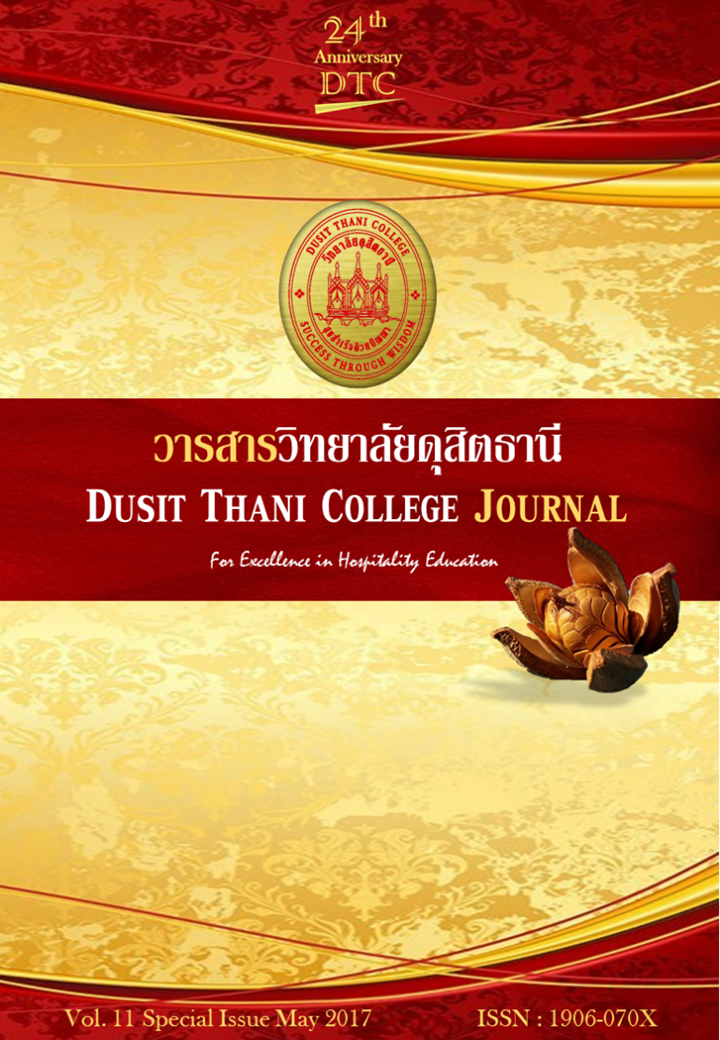The Development Model of Strategic Corporate Social Responsibility for Hotel Business’s Sustainable Performance in Thailand
Main Article Content
Abstract
This research aims 1) to study the compositions of strategic corporate social responsibility for sustainable performance of hotel business in Thailand and 2) to develop the model of strategic corporate social responsibility of hotel business in Thailand. The data were collected by questionnaire from 4-star and 5-star rated hotels nationwide, a total 238 hotels. The confirmatory factor analysis (CFA) was used to analyze the data. The results showed that the compositions of the strategic corporate social responsibility that order by factor loading score include the following; 1) The environmental friendly perspective, factor loading score is 0.90 2) The economic development perspective, factor loading score is 0.89 and 3) The social strengthening perspective, factor loading score is 0.79. The results of this research will be useful for applying in the field of strategic corporate social responsibility for hotel businesses and others organizations.
Article Details
Article Screening Policy
- All research and academic articles to be published must be considered and screened by three peer reviews in the relevant field / article.
- All articles, texts, illustrations and tables published in the journal are the personal opinions of the authors. Editors don't always have to agree. And no responsibility whatsoever is the sole responsibility of the author.
- The articles to be published must never be published. Where did you first publish? And not in the consideration of other journals If the audit found that there has been a duplicate publication It is the sole responsibility of the author.
- Any article that the reader sees as being plagiarized or impersonated without reference. Or mislead the work of the author Please let the journal editor know it will be your greatest blessing.
References
and Management Studies. 1(2), 6-10.
ASEAN Tourism. (2016). ASEAN GREEN HOTEL STANDARD. (Online.) Available from
file:///C:/Users/User/Downloads/20130111081324_asean_tourism_standards_book%20(1).pdf. Accessed January 11, 2016.
Bank of Thailand. (2015). Business Outlook Report: April, 2015. Available from
https://www.bot.or.th/Thai/MonetaryPolicy/EconomicConditions/BLP/BLP_TH_Q1_2015.pdf. Accessed September 26, 2016.
Carleton, L. K. (2009). Framing Sustainable Performance with The Six-P. Performance
Investment. 48(8), 37-44.
Carroll, A. B. (1979). A three-dimensional conceptual model of corporate performance.
Academy of Management Review. 4(4), 497-505.
Cronbach, L. J. (1970). Essentials of psychological testing. 3rd ed. New York: Harper & Raw.
Cvelbar, K. L. and Dwyer, L. (2013). An importance-performance analysis of sustainability
factors for long-term strategy planning in Slovenian hotels. Journal of Sustainable Tourism. 21(3), 487-504.
Department of Tourism. (2014). Accommodation Standard for Tourism (Hotel) Part 1.
Bangkok: Department of Tourism, Ministry of Tourism and Sports.
Du S., Bhattacharya, C. B. and Sen, S. (2007). Reaping relational rewards from corporate
social responsibility: the role of competitive positioning. International journal of Research in Marketing. 24(3), 224-241.
Elkington, J. (1997). Cannibals with Forks: the Triple Bottom Line of Twenty-first
Century Business. Capstone: Oxford.
Figge, F. and Hahn, T. (2004). Sustainable Value added. Measuring Corporate Contributions
to Sustainability Beyond Eco-Efficiency. Ecological Economics. 48(2), 173-187.
Friedman, M. (1962). Capitalism and Freedom. Chicago: University of Chicago Press.
Goel, P. (2010). Triple bottom line reporting: An analytical approach for corporate
sustainability. Journal of Finance, Accounting and Management. 1(1), 27-42.
Gray, R. and Milne, M. (2007). Toward reporting on the triple bottom line: Mirages, methods
and myths. In Henriques, A. and Richardson, J. (Eds.). The triple bottom line: Does it all add up?. London: Earthscan.
Hair, F., J., Black, C., W., Babin, J. B. and Anderson, E., R. (2006). Multivariate data
analysis. 6th ed. Upper Saddle River, NJ: Pearson Prentice Hall.
_______ . (2010). Multivariate data analysis. 7thed. Upper Saddle River, NJ: Pearson Education.
Husted, B. W. and Salazar, J. J. (2005). Un estudio exploratorio de la estrategia social
de empresas grandes ubicadas en México. Contaduríay Administración. 215, 9-23.
International Organization for Standard. (2010). ISO 26000: 2010. (Online.) Available from
https://www.iso.org/obp/ui/#iso:std:iso:26000:ed-1:v1:en. Accessed January 18, 2016.
Kasimu, A. B., Zaiton, S. and Hassan, H. (2012). Hotel Involvement in Sustainable Tourism
Practice in Klang Valley, Malaysia. International Journal of Economics and Management. 6(1), 21-34.
Lindfelt, L. L. and Törnroos, J. Å. (2006). Ethics and value creation in business research:
Comparing two approaches. European Journal of Marketing. 40(3/4), 328-351.
McWilliams, A. and Siegel, D. (2011). Creating and capturing value: Strategic corporate
social responsibility, resource based theory and sustainable competitive advantage. Journal of Management. 37(5), 1480-1495.
Newport, D., Chesnes, T. and Lidner, A. (2003). The environmental sustainability problem
ensuring that sustainability stands on three legs. International Journal of Sustainability in Higher Education. 4(4), 357-63.
Noonin, S., Jadesadalug, V. and Sansook, J. (2016). Component and pattern of strategic
corporate social responsibility: Hotel business in Thailand. APHEIT journal. 22(2), 69-78.
Pallant, J. (2010). SPSS Survival Manual: A Step by Step Guide to Data Analysis Using
IBM SPSS. 4th ed. Maidenhead: Open University: Press/McGraw-Hill.
Placet, M., Anderson, R. and Fowler, K. M. (2005). Strategic for Sustainability. Resource
Technology Management. 48(5), 32-41.
Rovinelli, R. and Hambleton, R., K. (1976). On the use of content specialists in the
assessment of criterion-referenced test item validity. Paper presented at the meeting of AERA, San Francisco.
Vanichbuncha, K. (2014). Structural Equation Model Analysis: SEM by AMOS. Bangkok:
Samlada.
Simon, A. H. (1945). Administrative Behavior: A Study of Decision-Making Processes in
Administrative Organization. New York: The Free Press.
Social Responsibility Center. (2013). Corporate Social Responsibility for Sustainable
Development. Bangkok: Social Responsibility Center, The Stock Exchange of Thailand.
Stern, N. (2006). Stern review on the economics of climate change. London: HM
Treasury Cabinet Office.
Tourism Authority of Thailand. (2016). Lodging. (Online). Available from
http://thai.tourismthailand.org. Accessed January 1, 2016.
UNWTO. (2013). World Tourism Highlights 2013. (Online). accessed August 29, 2015.
Available from http://www.e-unwto.org/doi/pdf/10.18111/9789284415427
Virakul, B. (2015). Global challenges, sustainable development, and their implications for
organizational performance. European Business Review. 27(4), 430-446.
Waddock, S. A. (2004). Parallel universes: companies, academic, and citizenship: towards
corporate accountability. Business and Society Review. 110(2), 191-212.
Yodprudtikan, P. (2012). CSR and Sustainable Development. Sukhothai Thammathirat
Journal of Economics. 6(2), 1-10.


